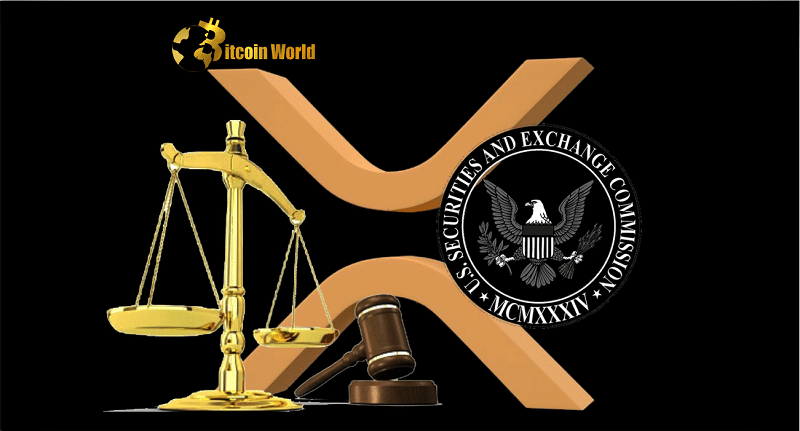The long-standing legal tussle between Ripple and the Securities and Exchange Commission (SEC) is far from over, and the latest developments are keeping the crypto world on its toes. Ripple’s legal team has recently fired back, challenging the SEC’s arguments in their ongoing battle. What’s the latest twist in this high-stakes legal drama, and what could it mean for the future of cryptocurrency regulation? Let’s dive into the details.
Ripple’s Counter-Argument: Fair Notice is Key
In a nutshell, Ripple is contesting the SEC’s claims that they violated securities laws. To bolster their defense, Ripple’s legal team responded to an SEC letter that cited a recent court case, SEC v. Commonwealth Equity Servs., LLC. This case, involving alleged violations of the Investment Advisers Act of 1940, was presented by the SEC to strengthen their position against Ripple.
However, Ripple cleverly flipped the script. They argue that the Commonwealth case actually *supports* their defense. How so?
- The SEC’s Reference Case: The SEC pointed to the Commonwealth case where a court ruled against a defendant for disclosure deficiencies under the Investment Advisers Act. The court in that case rejected a ‘fair notice’ defense.
- Ripple’s Rebuttal: Ripple argues that the Commonwealth case, despite the outcome, *highlights* the critical importance of ‘fair notice’ in legal proceedings. They claim the SEC failed to provide them with clear and adequate notice regarding the classification of XRP as a security.
- Supreme Court Precedent: The SEC argues that the Supreme Court’s Howey test and subsequent cases should have provided Ripple with enough ‘fair notice’.
- Ripple’s ‘Howey’ Challenge: Ripple’s legal team counters that relying on the Howey test as sufficient ‘fair notice’ in this specific context is insufficient. They suggest the application of Howey to digital assets like XRP was not clear-cut and lacked explicit regulatory guidance from the SEC.
Essentially, Ripple is using the SEC’s own cited case to underscore their argument that they were not given sufficient warning or clear rules regarding the SEC’s stance on XRP. It’s a strategic move to highlight what they perceive as a lack of regulatory clarity from the SEC.
The Commonwealth Case: A Double-Edged Sword?
Ripple’s legal team emphasizes a crucial point from the Commonwealth case: even though the court rejected the ‘fair notice’ defense in that instance, it was noted that the SEC had been aware of the activities in question for over two decades without issuing specific regulations. Ripple argues this strengthens *their* position.
Think of it this way:
| Aspect | Commonwealth Case (SEC’s Point) | Ripple’s Argument |
|---|---|---|
| Fair Notice Defense in Commonwealth | Rejected by the court. | Highlights the general importance of fair notice. |
| SEC Awareness in Commonwealth | SEC knew about the activities for 20+ years without specific rules. | Similar lack of clear rules for crypto/XRP from SEC. |
| Ripple’s Conclusion | SEC’s inaction in Commonwealth precedent mirrors their lack of clear guidance for Ripple, reinforcing the ‘fair notice’ defense. |
Ripple is essentially saying, “If the SEC hadn’t clearly defined the rules for decades in the Commonwealth case, despite knowing about the activities, how can they expect us to have understood the rules for XRP without explicit guidance?”
Why Does This Case Matter for the Crypto Industry?
The Ripple vs. SEC lawsuit is more than just a legal battle between two entities. It’s a landmark case that could set significant precedents for the entire cryptocurrency market and the regulatory landscape for digital assets.
Here’s why the crypto community is watching this case so closely:
- Regulatory Clarity: The outcome could bring much-needed clarity to the often-murky regulatory environment surrounding cryptocurrencies. A ruling in favor of the SEC might signal a stricter approach to crypto regulation, while a Ripple victory could push for more defined and reasonable guidelines.
- Impact on Crypto Startups: For cryptocurrency startups and projects, the verdict could be a game-changer. Clearer rules could foster innovation and growth, while ambiguous or overly strict regulations could stifle the industry.
- Market Confidence: The case’s resolution will likely influence investor confidence in the crypto market. Clarity, regardless of which side prevails, is generally better for market stability than prolonged uncertainty.
- Future of Digital Assets: The case will contribute to shaping how digital assets are classified and regulated in the future. Will they be treated as securities? Commodities? Something else entirely? This case could provide significant clues.
What’s Next?
For now, the legal back-and-forth continues. Both Ripple and the SEC are presenting their arguments, and the court will ultimately weigh the evidence and make a decision. The cryptocurrency world is holding its breath, anticipating a verdict that could have profound implications for the industry’s trajectory.
The ‘fair notice’ argument is a central theme in Ripple’s defense, and their strategic use of the Commonwealth case underscores their efforts to demonstrate a lack of clear regulatory guidance. Whether this argument will sway the court remains to be seen. One thing is certain: the Ripple vs. SEC saga is a crucial chapter in the ongoing story of cryptocurrency regulation.
Stay tuned as we continue to follow this landmark case and its impact on the digital asset landscape.
Disclaimer: The information provided is not trading advice, Bitcoinworld.co.in holds no liability for any investments made based on the information provided on this page. We strongly recommend independent research and/or consultation with a qualified professional before making any investment decisions.


